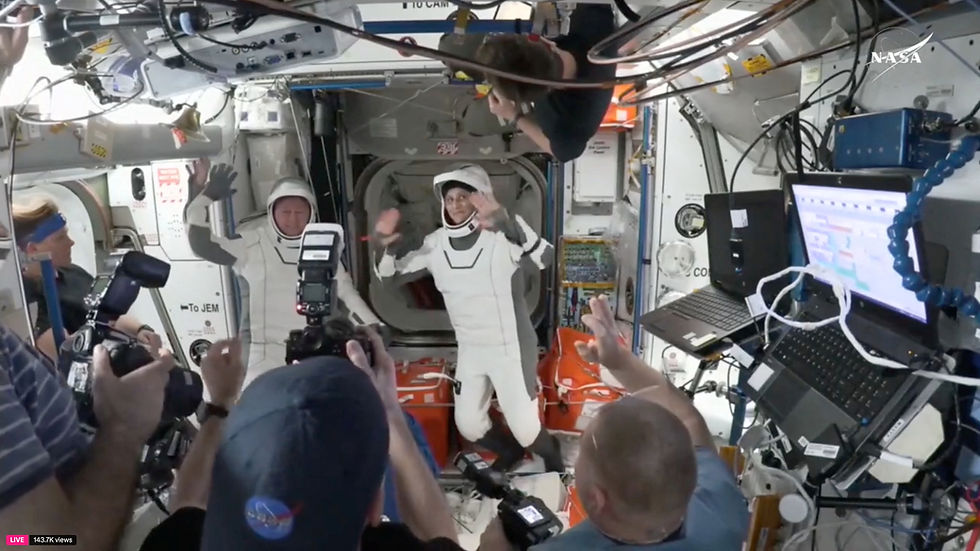'Is she Indian or Black?' Trump questions Harris' identity at Black journalists' convention
- News Agency
- Aug 1, 2024
- 4 min read

CHICAGO/HOUSTON/HARRISBURG, Pennsylvania - U.S. Republican presidential candidate Donald Trump falsely suggested to the country's largest annual gathering of Black journalists on Wednesday that his Democratic rival Kamala Harris had previously downplayed her Black heritage.
"She was always of Indian heritage, and she was only promoting Indian heritage. I didn't know she was Black, until a number of years ago, when she happened to turn Black, and now she wants to be known as Black," Trump said, drawing a smattering of jeers from an audience of about 1,000 people.
"So I don't know, is she Indian or is she Black? Trump continued. "But you know what, I respect either one, but she obviously doesn't, because she was Indian all the way, and then all of a sudden she made a turn, and she went - she became a Black person."
Harris, who is of Indian and Jamaican heritage, has long self-identified as both Black and Asian. She is the first Black person and Asian American person to serve as vice president.
Hours after Trump's comments, Harris told members of the historically Black sorority Sigma Gamma Rho gathered in Houston that his remarks were "yet another reminder" of what the four years under the former president looked like.
"It was the same old show of divisiveness and disrespect," Harris said. "The American people deserve better."
Since launching her White House campaign earlier this month, Harris has faced a barrage of sexist and racist attacks online, with some far-right accounts questioning her racial identity. Republican Party leaders have urged lawmakers to refrain from personal attacks and focus on her policy positions.
Trump himself has used personal insults against Harris and said he was going to ignore advice that he tone down his rhetoric. "I'm not gonna be nice!" he told supporters at one campaign rally.
'BLACK JOBS'
The interview at the National Association of Black Journalists' convention in Chicago started on a tense note, when ABC News reporter Rachel Scott - one of three Black women moderators - listed a series of racist comments Trump had made and asked why Black voters should support him.
In response, Trump called the question "horrible," "hostile" and a "disgrace" and described ABC as a "fake" network.
"I have been the best president for the Black population since Abraham Lincoln," he boasted, drawing groans from the audience.
Trump repeated a line from the presidential debate in June, claiming that migrants crossing the U.S. southern border would take away "Black jobs," a term that drew criticism from some Black leaders.
"What exactly is a 'Black job,' sir?" Scott asked him.
"A Black job is anybody with a job," Trump replied.
Trump also declined to say whether Harris was a "DEI hire," as some fellow Republicans have claimed, saying, "I don't know."
DEI stands for "diversity, equity and inclusion" initiatives aimed at increasing representation of women and people of color in the workforce to address longstanding inequities and discrimination. The term "DEI hire" is used to suggest a person is not qualified and was chosen on the basis of race or gender.
When asked about his position on granting police officers immunity following the death of Sonya Massey, a Black woman who was killed in her own home by a sheriff's deputy in Illinois, Trump acknowledged he didn't know much about the case - drawing some gasps from the crowd - before adding that "it didn't look good to me."
The interview began more than an hour late, which the Trump campaign said was due to problems with the event's audio equipment. Both Trump and the moderators were sometimes unable to hear each other during the interview.
The session, originally scheduled for an hour, ended abruptly after about 35 minutes when the campaign said he was out of time, according to the moderators.
At a rally in Pennsylvania later on Wednesday, Trump did not mention his comments about Harris' racial identity, but the arena's screens showed old news articles highlighting her Indian-American background, and not her Black heritage, before he took the stage.
Trump blamed Harris for a surge in immigration during the Biden administration and claimed she would ban fracking, playing a video that showed her endorsing such a ban during her failed presidential bid in 2019. Her campaign recently said she would not ban fracking if she wins the White House.
COURTING BLACK VOTERS
Whit Ayres, a Republican strategist, said Trump's questioning of Harris' racial background was "not a wise move."
"There are plenty of policy issues he can go after her on without going after her identity," he said.
In the 2020 census, 33.8 million Americans self-identified as multiracial, up from nine million in 2010.
The invitation to Trump to attend the event triggered a backlash among some members of the NABJ and prompted a co-chair of the convention to step down in protest this week.
During the interview, some of Trump's false statements were met with murmurs and laughter from the crowd. At one point, someone yelled out, "Sir, have you no shame?" before others shushed him.
Trump's appearance was part of a broader effort to court Black voters, including campaign events in cities with large Black populations such as Atlanta, where he will rally on Saturday.
His campaign was encouraged by polls showing weakened support among Black men for President Joe Biden, his former opponent. Black voters are traditionally the most loyal Democratic voting bloc and supported Biden 92%-8% over Trump in 2020, according to Pew Research.
But Biden's decision to step down in favor of Harris has shaken up the race, with public opinion polls showing newfound enthusiasm for her candidacy among voters of color and younger voters.
A national Reuters/Ipsos poll released on Tuesday showed Harris leading Trump 43%-42%, within the poll's margin of error.









.png)








Comments